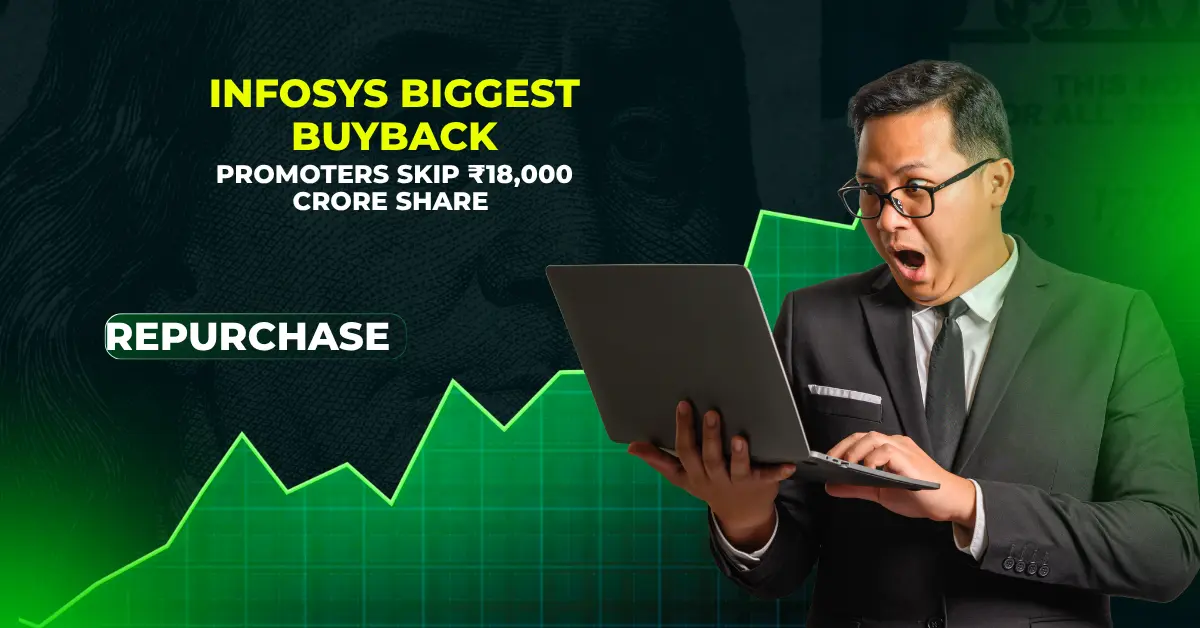Infosys ₹18,000 Crore Share Buyback: Promoters Opt Out – Big Opportunity for Retail Investors
Infosys Limited, India’s second-largest IT services company, has made headlines with its largest-ever share buyback announcement worth ₹18,000 crore. This massive share buyback program has caught the attention of over 26 lakh shareholders, especially after the company’s promoters decided to opt out of the offer.
In a regulatory filing on October 22, 2025, the Infosys buyback announcement revealed that promoters including Narayana Murthy, Nandan Nilekani, Sudha Murty, and their family members will not participate in the buyback process. This strategic decision has increased excitement among retail investors, as it improves their entitlement ratio and signals strong confidence from the founding families.
Understanding the Infosys Share Buyback Details
The Infosys share buyback was approved by the company’s board on September 11, 2025. Under this buyback program, Infosys will repurchase 10 crore fully paid-up equity shares at a price of ₹1,800 per share through the tender offer route. This buyback represents approximately 2.41% of the company’s total paid-up equity share capital.
The Infosys buyback price of ₹1,800 per share offers a premium of about 19% to 22% over the stock’s market price at the time of announcement, making it an attractive proposition for shareholders looking to book profits. This share buyback initiative aligns perfectly with Infosys’ capital allocation policy, which aims to return approximately 85% of free cash flow to shareholders over a five-year period through dividends and buybacks.
Why Promoters Opted Out of Infosys Buyback
The decision by Infosys promoters to skip the buyback is significant and sends a positive message to the market. The promoter group collectively holds a 13.05% stake in Infosys, including major shareholders like Sudha Gopalakrishnan (2.3%), Rohan Murty (1.46%), Nandan Nilekani (0.98%), and Narayana Murthy (0.36%).
When promoters opt out of a share buyback, it typically signals their confidence in the company’s long-term prospects and growth potential. By choosing not to tender their shares, the Infosys buyback promoters demonstrate their belief that holding onto their equity stake will create more value in the future rather than exiting at the buyback price.
Moreover, this decision benefits retail investors directly. Since the Infosys buyback entitlement ratio calculation excludes promoter shares, public shareholders will receive a higher proportion of shares accepted in the buyback, improving their chances of participation.
Benefits of Infosys Share Buyback for Investors
The Infosys buyback 2025 offers multiple advantages to shareholders. First, investors can sell their shares at a premium price of ₹1,800, which is significantly higher than the prevailing market rate. This provides an immediate profit-booking opportunity for those who wish to exit their positions.
Second, the buyback will reduce the total number of outstanding shares in the market, thereby increasing the earnings per share (EPS) and return on equity (ROE) for remaining shareholders. This financial engineering enhances shareholder value over the long term by improving key valuation metrics.
Third, retail investors holding shares worth up to ₹2 lakh enjoy a special reservation quota under SEBI regulations, making it easier for small investors to participate successfully in the buyback process. With promoters opting out, this advantage becomes even more pronounced.
Infosys Buyback History and Capital Allocation
This marks Infosys’ fifth share buyback since 2017, reinforcing the company’s commitment to returning surplus cash to shareholders. The Infosys buyback history includes a ₹13,000 crore buyback in 2017 at ₹1,150 per share, ₹8,260 crore in 2019, ₹9,200 crore in 2021, and ₹9,300 crore in 2022 through the open market route.
The current ₹18,000 crore buyback stands as the largest in the company’s history and reflects strong free cash flows and robust financial health. According to Infosys’ capital allocation policy, the company plans to progressively increase its annual dividend per share while maintaining disciplined capital management practices.
Market Reaction to Infosys Buyback News
Following the announcement that promoters would not participate in the buyback, Infosys shares surged nearly 4% to 5% on October 23, 2025, emerging as the top Nifty gainer. The stock price rally demonstrates positive investor sentiment and confidence in the buyback program.
The Nifty IT index also witnessed a significant jump of 2.4%, reflecting broader optimism in the technology sector. Market experts view the promoters’ decision as a strong signal of confidence in Infosys’ future growth prospects, especially amid the company’s focus on AI-driven digital transformation initiatives.
Tax Implications and Investor Considerations
While the Infosys share buyback offers attractive premiums, investors should consider the tax implications before tendering their shares. Buyback proceeds are taxed as capital gains, with rates depending on the holding period of shares. Long-term capital gains may receive preferential tax treatment compared to short-term gains.
Investors need to evaluate whether accepting the buyback price or holding shares for potential future appreciation makes more financial sense based on their investment goals, tax situation, and market outlook. The decision ultimately depends on individual investment strategies and time horizons.
What This Means for Infosys’ Future
The Infosys buyback 2025 reflects the company’s strong balance sheet and cash generation capabilities despite challenges in the IT sector. With over ₹42,000 crore in cash and cash equivalents and more than ₹20,000 crore in free cash flow for FY25, Infosys remains well-positioned to fund both growth initiatives and shareholder returns.
The buyback, combined with the company’s focus on artificial intelligence, cloud computing, and digital transformation services, positions Infosys favorably for long-term growth. The management’s confidence in allocating capital efficiently while rewarding shareholders demonstrates balanced financial stewardship.
Disclaimer
This article is for educational purposes only and should not be considered as financial advice. Investors are advised to consult with certified financial advisors and conduct thorough research before making any investment decisions. Past performance does not guarantee future results. The share buyback offer is subject to regulatory approvals and terms specified in the official tender offer documents.
